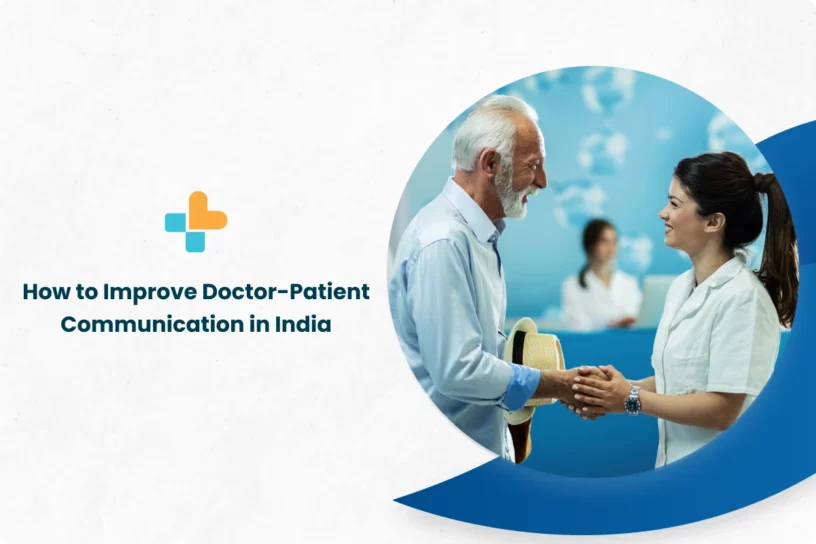Effective doctor-patient communication is becoming increasingly important as the healthcare sector develops. The needed communication skills may be hampered in India by a number of issues, including language barriers, cultural disparities, and health literacy. But now that telemedicine has become more popular and technology has advanced, there are additional options for better patient care and communication. In this blog, we’ll talk about telemedicine, its uses, virtual and in-person treatment integration, technology, and how to enhance doctor-patient communication in India.
How telemedicine is reducing the gap between health seekers and providers
The growth of telemedicine has been one of the biggest developments in healthcare. It is now simpler for individuals to obtain healthcare services anywhere thanks to telemedicine, a technology that allows patients and physicians to connect across long distances. In India, healthcare facilities are difficult to access where several folks live in rural regions, hence this technique has grown in popularity.
It came under the limelight during the COVID-19 pandemic when patients couldn’t move out of their houses to seek medical help. Telemedicine can bridge the communication gap between patients and medical professionals. Patients can contact their doctors via telemedicine by texting, calling, or participating in video consultations. With the use of this technology, people won’t have to drive far to see a doctor, improving accessibility and convenience.
This technology holds a lot of potential. It offers hope for the inclusion of those who have historically been excluded, such as backward castes, the elderly, the disabled, and women who are provided last in the hierarchy of healthcare needs.
Trust: the foundation for positive health treatments
Effective communication between a doctor and a patient depends on trust and shared decision-making. People must have faith in their medical professionals to deliver correct information, diagnoses, and treatments. Doctors must also have faith in their patients to be open regarding their health and symptoms.
In India, trust may pose a big problem in the doctor-patient relationship. Many people may lack trust in doctors and medical professionals as a result of their unpleasant experiences with the healthcare system. For example, corrupt practices, discrimination, or inequity in healthcare are behaviors that damage the patient-doctor relationship. Doctors must be open and truthful with their patients if they want to gain their trust. Also, they must make the time to hear the worries of their patients and respond to any queries they may have. It’s necessary that doctors respect their professional boundaries, and no behavior should transgress that.
Integration of virtual and in-person care
By giving people more alternatives for obtaining healthcare services, the integration may help to improve doctor-patient communication. Whether it’s a video appointment or an in-person visit, patients can select the mode of medical consultation that suits them the most.
A hybrid care system shall have several benefits overall. By removing drives and waiting periods where patients may be exposed to viruses, the virtual component benefits the patients. Such a hybrid model shall efficiently deal with the problem of doctor shortage as well as reduce the staff required to monitor the patients. Consequently, this will lower the costs borne by the hospital.
However, a standard criterion needs to be set to categorize patients for virtual visits or in-person visits. Some factors to be considered are a diagnosis of the patient, symptoms and urgency, age, etc.
Technology forging connections between patients and doctors
Building relationships between patients and physicians now requires the use of technology. The development of telemedicine and other technological breakthroughs has made it easier and more effective for doctors to interact with their patients and boost patient engagement. For instance, doctors may track their patients’ health using mobile health applications and give them individualized care. By gathering information on patient’s symptoms, medicine use, and other health-related data, these applications help clinicians make diagnoses and treatment recommendations that are more precise.
Technology can also assist medical professionals in communicating with patients and grow cultural sensitivity for those who may experience linguistic or cultural obstacles. For instance, in order to converse with patients who speak different languages, doctors can utilize translation applications or services.
Final word
Consider using telemedicine in your practice if you’re a healthcare professional in India and if you want to communicate with your patients better. Spend time developing a rapport with the patients and combining in-person and virtual treatment to deliver more individualized care. And if you’re a patient, make sure to do your research before consulting a doctor. This will help in getting clarity on the services provided. It’s crucial to keep in mind that good communication requires both patients and physicians to be open and truthful with one another.
Are you currently looking for some patient-friendly healthcare providers? Look no more! Ayu Health provides perfect patient-centered care, catering to the patient’s needs. Contact 6366100800 for more knowledge.
Our Hospital Locations
General Surgery Hospitals in Chandigarh | General Surgery Hospitals in Bangalore | General Surgery Hospitals in Jaipur | General Surgery Hospitals in NCR | General Surgery Hospitals in Hyderabad
Our Doctors
General Surgery Doctors in Chandigarh | General Surgery Doctors in Bangalore | General Surgery Doctors in Jaipur | General Surgery Doctors in NCR | General Surgery Doctors in Hyderabad
About the Author

Dr. S. Goel
Dr. S. Goel is a renowned Internal Medicine Specialist currently practicing at Ayu Health, Bangalore. He is a Specialist in Internal Medicine, Diabetes HTN, Paediatric Care, and Family Medicine.




